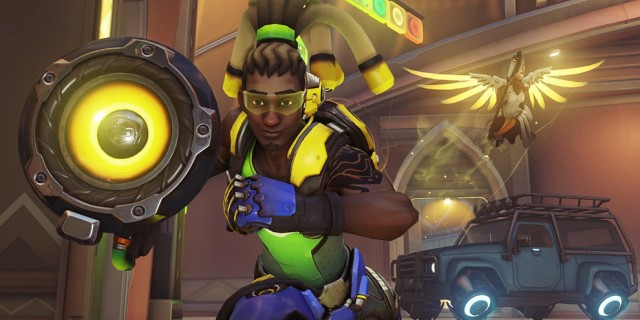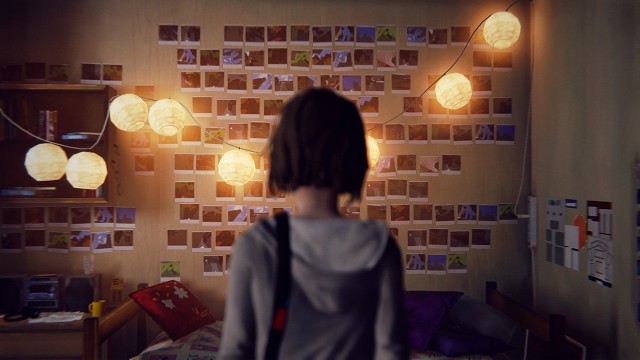A note: I’ve only played through on low chaos with Emily so far, so while I’ve read about high chaos choices and Corvo playthroughs, I speak from the vantage of only intimately knowing my own adventure to reclaim Emily’s throne. Note also: spoilers here!
When Emily was revealed as the protagonist of Dishonored 2, we rejoiced, and when we discovered players would be given a choice between Corvo and Emily, some of that joy faded a bit. So often, this seems the way: offer a choice so that a game doesn’t have to fall on the shoulders of women, and that seemed like what was happening here. What we didn’t know then, couldn’t know, was that so many of the compelling stories in Dishonored 2 would be women’s stories, that women would drive the narrative and shape the game. It’s not only that the villain is a woman, but that the narrative of Dishonored 2 is constructed wholly of women’s stories, even if the player chooses Corvo. Women shape what happens here; they build it, and their stories are uniquely the stories of women, women broken down in service to men, women who rise only to be sacrificed, women who stand up for other women (and suffer for it). Of course, men figure heavily in the narrative, but women lie at the heart, with a litany of st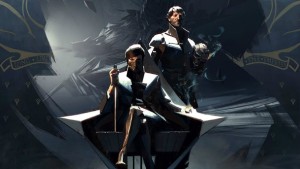 ories taking cues from the franchise’s Victorian-adjacent setting. For those who played the DLC for the original Dishonored, many of these characters and their stories were already set up then, but with Daud rather than the Kaldwin-Attano trio driving the main storyline.
ories taking cues from the franchise’s Victorian-adjacent setting. For those who played the DLC for the original Dishonored, many of these characters and their stories were already set up then, but with Daud rather than the Kaldwin-Attano trio driving the main storyline.
This certainly isn’t to say Dishonored 2 is perfect; in fact, I find it disappointing compared to the unequaled original, despite a few truly breathtaking levels. Overall, the combat is more frustrating, lacking the seamless, natural feel of the original, as though added difficulty was layered over the game for reasons unknown. I played on hard and really felt it in a way I didn’t with the original. As for the story, the narrative relies on tropes as heavily as any other video game, but the women-centered narratives here are fresh, elevating a very typical story of revenge and reclamation, turning it into something else entirely… and, along the way, perhaps proving that strong women don’t have to sink games (though other decisions certainly can). A bit more story, a little life injected into Emily herself, and perhaps adjusting enemies so they don’t see you across the damned continent, and this game could have wholly lived up to its best moments.
But let’s talk about the women. With the exception of Emily herself, the women of Dishonored 2 are older, and look it; life has not always been kind to them. Their faces and figures tell stories of their own, before we even learn about them as characters.
Delilah Copperspoon, the Villain
Delilah’s story is a common one from fictional worlds with royal lines and titles, though the narrative of the bastard is more often a man’s story, the tale of the son-who-should-be-heir, who is usually better and more capable than the legitimate heir. Dishonored 2 doesn’t take this route with Delilah — we never know how she might have grown up, if her situation had been different, but it doesn’t matter; at the heart of her more traditionally male story is an inherently female story: the story of her mother. Delilah’s mother was a maid who bore the child of a man far above her station. We don’t know if she entered this relationship willingly or not. Does it matter? Such an imbalance of power makes this a moot point; her feelings were likely secondary to the situation. Maybe she loved him, maybe she was forced or cajoled, or maybe she was indifferent and simply felt she could not say no. With any of these, the result is the same, and it’s her story that really shapes Delilah’s. When a young Delilah is punished for legitimate half-sister Jessamine’s lie, the child and her mother are put out of the castle, cast off as discards. Obviously, the affair didn’t mean much if they could be pushed out so easily. Stripped of any power or position she might have enjoyed, even just as a castle maid, Delilah’s mother suffers, ends in debtor’s prison, and ultimately dies. The association with a powerful man undoes her, as with countless women in fiction.
From this, Delilah rises, seeking power of her own – perhaps as a way not only to avenge her mother and her own lost privilege, but to be certain she never ends up like her, the used-up plaything of a careless man. Delilah is incredibly tough in her own right, a character who has accomplished amazing feats. Had she been a little less evil, we could have probably just shrugged the whole coup thing off and let her rule. But Delilah is evil, so evil that she and her co-conspirators kill indiscriminately in their quest for power, so she cannot be ignored or left alone. She must be eliminated.
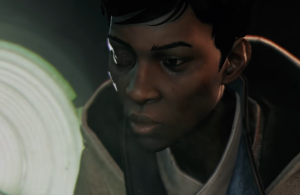 Meagan Foster, the Ally (sort of)
Meagan Foster, the Ally (sort of)
Meagan Foster was, for me, one of the game’s potentially most fascinating characters. A one-armed, one-eyed ship captain who ends up helping Emily, though she had an agenda of her own before the events of the coup. Meagan is guarded around Emily, slowly warming to her and opening up, and we learn of her vast connections to the larger narrative only much later in the game. Meagan was born a discard, unwanted and abused, and like many women of situation, might have ended a prostitute. Prostitutes in Victorian fiction are sometimes surprisingly layered, but the world of Dishonored doesn’t go quite that far; for Meagan, that would have left her much like Delilah’s mother: suffering at the whims of men. She chose something else, something more violent, but something that led her down a twisting path; throughout her story, which ties in with the original DLCs as well, Meagan clings to her agency, and even manages to direct the displaced young Empress. Her confessions (if given in the game, based on player action) deepen her story, but ultimately, I wanted more for her and from her. Meagan’s relationship with Sokolov was ripe for development, but it’s a stone left unturned here. The ending, however, may hint at a turn of that stone in the future.
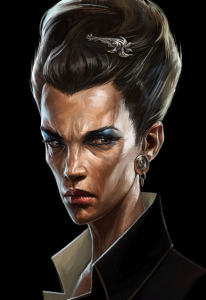 Breanna Ashworth, the Witch
Breanna Ashworth, the Witch
Breanna’s story, like Delilah’s, is almost enough to make her sympathetic. Born into nobility to a family who tried to mold her into a proper young lady, Breanna rebelled. In an audiograph, she fondly recalls nights spent drinking wine under the stars, and the way she chose to run rather than be married off as chattel. More than anything else, Breanna desired the chance to be free, and ultimately found her freedom in witchcraft. Her story, and her motivations, are different from Delilah’s. Delilah wanted power, whereas Breanna reflects a more traditional “witch” story for women in fiction — women with no other outlet choosing to give up everything they were to become something greater, something wanton and free. While there are dozens, hundreds of stories of sorcerers, spellcasters, and more in fiction and history, the link between women and witches in British and early American history in particular is one linked to trapped womanhood breaking free, and Breanna’s story is a reflection of that, as is Breanna’s sexuality and implicit sexual relationship with Delilah. I’m glad more wasn’t made of the latter, frankly; lesbians as evil witches pushes the trope into the realm of melodramatic predictability (Psycho Lesbians ahoy).
The coven in general though is womanhood on display, and it’s a shame it’s wasted on throwaway villains the protagonist must fight without much consideration. While the guards do have conversations, they are mostly surface, and the more interesting moments come when they are talking to themselves rather than someone else. The witches, however, lounge and gossip, and they will run to protect one another not because it’s their job, but because they seem to care. They are a fascinating study of the larger world of Dishonored 2; they are disaffected, but dedicated to their new way of life. They talk shop, they share information, they sulk and pout, they sit on railings and dangle their feet. They call each other sister, but unlike the Overseers, who call each other brother but seem to hate everyone, including themselves, there is tangible sisterhood here.
Alexandria Hypatia, the Doctor
The inventors Sokolov and Jindosh are major figures in the world of Dishonored, but Alexandria Hypatia is a force unto herself. A healer who seeks solutions rather than glory, her concern for others is twisted against her when she becomes a pawn in the political schemes of Duke Abele. The Dr. Jekyll of the narrative, Hypatia transforms not as a way to hide her vices, but instead falls victim to side effects of a potential cure she tests on herself. The serum, meant to cure victims of lung problems from working in the silver mines, creates an alter ego, Grim Alex, who is manipulated into committing the series of murders attributed to the Crown Killer. Using the Jekyll/Hyde story here is fitting — Stevenson’s story was published some 30 years after the dates in Dishonored 2, and the franchise is closely tied to Victorian legend and fiction already. Turning the character here to a woman, however, and corrupting her desire to heal (a trait also often associated with the feminine) offers a unique twist.
Dr. Hypatia’s roots run even deeper, as she’s named for Hypatia of Alexandria, an ancient mathematician and philosopher considered one of the earliest great women of science. While much of her story occurs offscreen in the game, her very identity is a touchstone for women who strive for something greater than themselves.
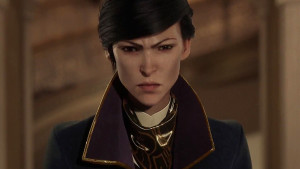 Emily Kaldwin, the Empress
Emily Kaldwin, the Empress
In a game of women, and women’s stories, the selectable female protagonist could and should offer much insight, but it’s here that Dishonored 2 missteps, I think, by making Emily more of a blank slate. There simply isn’t much to her; she loved her mother, she appreciates her father but chafes under his fatherly advice. We’re told she didn’t much like to rule, and wasn’t terribly successful at it, but these are throwaway conversations and remarks; we never get to know her. The game’s inciting incident kicks off within moments, leaving us with an empty Emily we can fill with stealth and concern or murderous rage. She is hollow.
While I felt a connection to the people on the Dreadful Wale, particularly the women, the game itself offers little of this. Emily herself is unconnected; has no friends, no romantic entanglements, no desires, none of the passion or power of her mother. In the first game, we also only knew Jessamine for moments before the game began, but we got a sense of her, then and through the use of her heart. Here, there’s nothing. Even playing the tutorial reveals little of Emily’s personality. She has a bond with her father, but we knew that. Her disaffected voice is a less-gritty, slightly feminized version of her father’s. She’s strong, capable, and mostly emotionless, remarking seldom on the suffering and extreme poverty in the empire she’s trying to reclaim. There is a hint of friendship between Emily and Captain Alexi, who dies immediately in the first mission, but we are never allowed to see this, either. We are presented with an Emily we can shape and mold, much as we shaped her father in the first game, and while this is in keeping with the game, it also meant, for me, that the central struggles of Emily’s character — who she would become, with her throne regained — rang somewhat hollow. In the end, Emily the Just or Emily the Vengeful? It didn’t much matter; I hadn’t seen her before, and wouldn’t see her after. I chose a softer path not for her, but for everyone else forced to make their way in this world.
Dishonored 2 clearly has something to say about politics, about class and hierarchy, and we get it in fits and starts: the exploitive Duke, and Emily’s own lack of engagement with the problems around the mines, the bodies lying in the streets, the bloodflies, the gangs, the palatial homes contrasted with the darker lives of the lower classes. But even when they are the products of tropes and common story beats, the women of Dishonored 2 are fascinating; tropes turn in on themselves, stories are subverted, and the result is a female-centered narrative like no other in a major release. More, it’s closer to something fully realized than the others. Duke Abele is simply evil. Kirin Jindosh is an evil genius, less interesting in himself as his creations are. The women are more complicated, and while their stories may not be as pat as those of Abele and Jindosh, with clean beginnings and endings, they’re better for that very messiness, for the humanity and moral ambiguity, and with these women, Dishonored 2 is reaching for something like a real critique of society, not surface gesturing as with games like Deus Ex: Mankind Divided, and though it ultimately falls short, I applaud the attempt and the way it was executed.

